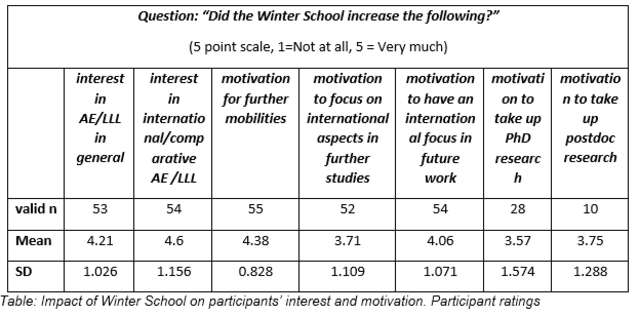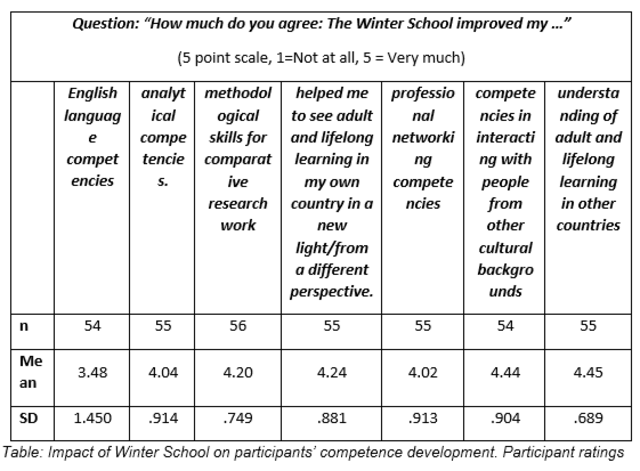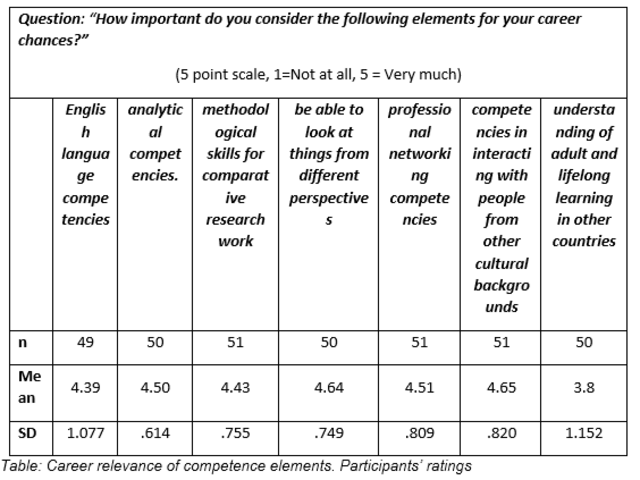Evaluation 2018
Evaluation results - Adult Education Academy (former Winter School) 2018
Extraction of the external evaluation results,
which was conducted by German Institute for Adult Education, Susanne Lattke
COMPALL-Project Coordinator: Julius-Maximilian University Würzburg, Prof. Dr. Regina Egetenmeyer
Participation in the 2018 Evaluation
The Winter School 2018 evaluation is based on the paper questionnaire which was distributed by the working group leaders to all participants on the final day of the Winter School. The International Winter School 2018 was attended by a total of 61 participants. The number of filled questionnaires amounted to 59, so that the response rate is 96.7%. About two thirds of the participants (42) were Master students and one third (19) were PhD students. The sample of respondents reflects the same 2:1-relation between MA and PhD students (31 Master vs. 14 PhD). 14 respondents chose not to indicate their study level in the questionnaire.
Participants’ Satisfaction
The Winter School in 2016 had set out already on a very high level, as far as both participant satisfaction and perceived benefits/impact of the Winter School are concerned. The Winter Schools in 2017 and 2018 not only have maintained these level but managed to achieve even further improvements in the participant ratings over the three years. The overall assessment shows that the participants’ general satisfaction with the International Winter School was very high. The mean value was 4.42 (n=48) which means an improvement compared to the already very high values of the two previous years (4.20 and 4.24 respectively).

Again, participants’ satisfaction turned out to be very high for all aspects with each single mean value being above 4.0. This, too, means a further improvement compared to the previous year(s), although values had been rather high already in 2016 and 2017. In particular, satisfaction with the preparatory phase has increased compared to 2017. This show that the new preparatory offers (video tutorials, online information tools) which have been developed by the organisers since the last year, are well accepted by the participants. Complaints from the first year regarding the academic content of the Winter School or the composition of the participants group (uneven skills levels, e.g. regarding English proficiency, or unbalanced geographical distribution) have greatly diminished over the years. This suggests that the organisers have been successful in establishing an effective recruiting policy which ensures that potential participants are well informed about what they have to expect from the Winter School and what is required from them for a successful participation. At the same time, the geographical distribution of participants’ countries of origin became more balanced over the years: the numerical dominance of a few countries was reduced and it became easier to compose the working groups within the Winter Schools in a way to include a broad range of different country perspectives.
Participants’ Competence Development
In the later years 2017 and 2018, the focus on academic and professional content has become clearer, whereas in 2016 participant feedback had still focused very prominently on intercultural and social outcomes, including networking opportunities. These intercultural and social aspects remained important also in 2017 and 2018, however they were no longer the dominating feature in the participant feedback. Rather, the Winter School increasingly appears as a learning offer which combines in an integral way specific subject-related competence development with the development of transversal competences and personal soft skills, besides offering a highly enjoyable experience and an excellent opportunity for building up personal and professional networks.


Impact Career on Career Chances
The career relevance of the Winter School (outcomes) have been unchangeably rated positively by the participants in all years, which suggests that the Winter School concept reflects well the competence needs in both an academic context and the labour market.

Summary of external evaluation
One can conclude that the overall concept of the Winter School seems highly sustainable and does not need to be changed in a substantial way. There will be a need to secure the necessary financial means for the running of the Winter School after the Erasmus project funding has ended. Since the Winter School can rely on a solid consortium of partners and since during the project’s lifetime a substantial basis of materials was built up which can be used also in the future, there are good prospects for the Winter School to become a sustainable offer in the long-term. An appropriate information policy to reach and support (prospective) participants seems essential for the future success of the Winter School. A substantial part of the critical remarks made by participants in all years can be attributed to wrong expectations on the side of the participants or to a (felt) lack of orientation or preparation. The Winter School organisers are aware of this issue and have already developed with some success their information and support offers over the years. Also in the future, this issue of information and preparation of the participants should receive particular attention, as its impact on the Winter School success and the satisfaction on the participants seems considerable. The preparation phase underwent substantial developments over the three years, with many new materials (videos, tutorials, guidelines) being developed to support participants in their own work prior to the intensive phase in Würzburg. These materials are clearly appreciated and found helpful by the participants. They, too, should be kept as a regular feature and be updated as needed. By way of a concluding overall appreciation, it can be stated that the International Winter School obviously provides a very attractive and highly effective opportunity to students from (potentially) all over the world to learn and develop as an individual and as a (future) professional in the field of adult education in an increasingly globalized context. Moreover, the Winter School has shown its ability to develop and improve further over the years so as to satisfy participants’ needs and expectations to an ever higher degree.


